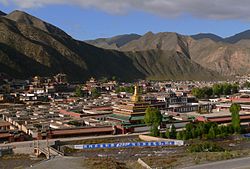Top Qs
Timeline
Chat
Perspective
Xiahe County
County in Gansu, China From Wikipedia, the free encyclopedia
Remove ads
Xiahe County (Chinese: 夏河县; Tibetan: བསང་ཆུ་རྫོང་།) is a county in Gannan Tibetan Autonomous Prefecture, Gansu province, China, bordering Qinghai province to the west. The name (both Chinese and Tibetan), which literally means "Xia River", refers to the Daxia River which runs through the county. It is home to the famed Labrang Tibetan Buddhist monastery, one of the largest Tibetan Buddhist monasteries outside the Tibet Autonomous Region. The town is populated largely by ethnic Tibetans, as well as some Hui and Han Chinese. The area is highly rural and pastoral (including yak and other animal rearing). The geography is mountainous. In recent years it has become a tourist attraction. The county was named Xiahe in 1928, after the Daxia River that flows through its territory.


Remove ads
History
Xiahe (Sangqu) used to be part of Qinghai when it was under the control of Chinese Muslim General Ma Qi.[2] It was the site of bloody battles between Muslim and Tibetan forces.[3][4][5]
In 1980, Xiahe mandible, a hominin fossil jaw, was discovered in Baishiya Karst Cave, Xiahe County.
Location
Summarize
Perspective
Xiahe (Sangqu) is found in the southern portion of Gansu province, along the western border with Qinghai province. It lies along the Daxia and Zhao rivers. It is on the northeast edge of the Tibetan Plateau. The average elevation is 2,900 to 3,100 m (9,500 to 10,200 ft) with the highest being 4,636 m (15,210 ft) and the lowest 2,160 m (7,087 ft).
Climate
Xiahe County has an alpine subarctic climate (Köppen Dwc) that grades into an alpine climate (ETH) at the highest elevations. The climate is characterised by mild, rainy summers and frigid, but dry and sunny, winters.
Remove ads
Administrative divisions
Summarize
Perspective
Xiahe County is divided to 8 towns and 5 townships.[8]
References
External links
Wikiwand - on
Seamless Wikipedia browsing. On steroids.
Remove ads




